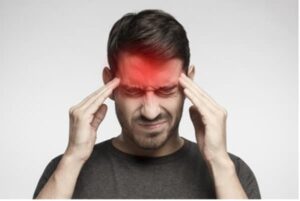Migraines are one of the most common health conditions in the world, yet there is still a lot of misinformation about them. Read our latest blog to see the top 5 migraine myths debunked!
An Overview on Migraines
A recurring headache that can cause severe pain and discomfort is known as a migraine. Often striking out of nowhere, migraine attacks come accompanied by other symptoms, such as nausea, vomiting, and sensitivity to light and sound. There are many different types of migraines that can be caused by a variety of things. The exact cause remains unknown, but one thing is for sure: they’re no fun. While there’s no surefire cure for migraines, some things are able to help lessen the frequency and severity of attacks.
Myth #1) Migraines are just another headache
Anyone who has ever experienced a migraine knows that they’re not just a “bad headache.” Migraines are a form of headache that is characterized by severe pain, throbbing, and sensitivity to light and sound. Migraines often come with other symptoms, such as nausea and vomiting. Most individuals with migraines experience attacks that can last for hours or even days, with sharp and pulsing pain exceeding that of your ordinary headache.
Myth #2) There’s nothing you can do about migraine pain
Often, patients with migraines feel like there’s nothing they can do about the pain. But that’s not true! While there’s no cure for migraine headaches, you can help ease the pain and make them more manageable by taking some simple steps. Some may find relief by taking over-the-counter pain medications, such as ibuprofen or acetaminophen. Others may need prescription medications for acute symptoms, such as triptans or dihydroergotamines. In other cases, preventive treatments, such as Botox injections or other prescription medications, can help to reduce the frequency, duration, and severity of migraine attacks.

Myth #3) Migraines only affect women
Though migraines are more common in women, they can affect anyone. In fact, migraine is the third most common disease in the world, affecting children, teens, and adults of all genders. While hormonal changes may play a role in the higher prevalence of migraines in women, another possibility is that women are often more likely than men to seek medical help. Whatever the reason, it’s clear that migraines are not just a woman’s problem. According to Harvard Health, migraine sufferers may have a higher risk for stroke and heart disease as compared to people without migraines.
Myth #4) All migraines are the same
Though many individuals with migraine pain experience nausea and sensitivity to light and smells, there are different types of migraines. For example, types of migraines include migraine with aura, migraine without aura, chronic migraine, and the list goes on. Differentiating between types is essential for finding the right treatment plan.
Myth #5) The more medication, the better
If you are prone to migraines, you’re probably familiar with the various medications that are available. However, it’s important to be mindful, as taking too much can be counterproductive and worsen migraine pain. Over-the-counter drugs like ibuprofen and aspirin can cause what is known as rebound headaches if taken too frequently, while prescription drugs such as triptans can lose effectiveness over time. If you find yourself relying on medication to get through your day, be sure to talk to a doctor and discuss the best treatment options for you. There’s nothing to gain from migraine pain!

Migraines can keep you from performing at your best. Studies are currently enrolling for adults with migraine headaches. Eligible participants may have access to doctors and other medical professionals at no cost, receive access to study medications, and compensation for time and travel. Visit our website or contact us at (206) 522 – 3330 extension 2 to find out more.
Resources:
https://www.hopkinsmedicine.org/health/conditions-and-diseases/headache/migraine-headaches
https://americanmigrainefoundation.org/resource-library/what-is-migraine/



